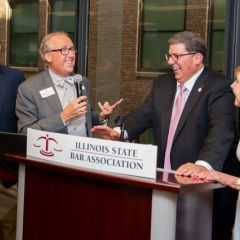CLE: The Pension Reform Act Litigation: A View From Both Sides – Live Webcast
The Illinois Pension Reform Act was recently struck as unconstitutional by the Illinois Supreme Court, which will have a significant effect on government efforts to address the state’s pension obligations. Attorneys with advanced levels of practice experience working in the labor/employment, government, administrative law, and state tax arenas won’t want to miss this opportunity on September 10th to hear opposing counsel from the In re: Pension Reform Litigation case as they examine the arguments each made in court, why these arguments were made, and the reasoning behind the landmark ruling. An explanation of the Pension Protection Clause and the Contract Clause is also included.
The live webcast is presented by the ISBA Labor & Employment Law Section and qualifies for 1.0 hour MCLE credit.


 ISBA Governor Stephen Komie was among approximately 750 U.S. attorneys who traveled to Runnymede, England to celebrate the 800th anniversary of the sealing of the Magna Carta. The lawyers came to to celebrate the Magna Carta’s worldwide impact while promising to rededicate themselves to the ideals and principles contained in, and inspired by, the famed legal document.
ISBA Governor Stephen Komie was among approximately 750 U.S. attorneys who traveled to Runnymede, England to celebrate the 800th anniversary of the sealing of the Magna Carta. The lawyers came to to celebrate the Magna Carta’s worldwide impact while promising to rededicate themselves to the ideals and principles contained in, and inspired by, the famed legal document.